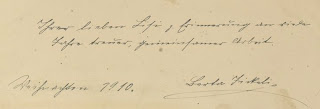This photo hung in my grandmother’s house for her entire life. The image has been carefully stylized to depict what women did in at the turn of the last century, but hidden on the back for 100 years was an inscription that gave insight into what they believed.
Women’s work: peeling potatoes, mixing ingredients, grinding meat, baking (a large container labelled “Zucker” [sugar] sits on the table), cooking, spinning, knitting, washing, and ironing [two irons were used, one heating on a stove to be switched out with the the one in use when it cooled off]–all tasks necessary to keep a household running smoothly in the early 20th century.
My grandmother, Lisi Ebner, is seated second from left, whisking up something in a bowl. In the center, dressed in black, is Berta Jickeli, the employer of the women in the photograph. It’s hard to see, but she’s holding knitting needles in her hands. My grandmother adored Mrs. Jickeli, as she always called her, and was devoted to her daughter, Lisbeth [LIZ-bett], the little girl at the washtub, for whom she was governess.
Uli, the professor whom I met on the 2007 roots-finding mission, told me that the Jickelis were a prominent and wealthy family in the area. Mrs. Jickeli’s husband, Carl Friedrich Jickeli, owned a large hardware store in the center of Hermannstadt. Their children were educated and accomplished. Mrs. Jickeli’s nephew, her sister’s son, was Hermann Oberth, known as the “father of rocketry/space travel.”
Clearly impressed, Uli asked how my grandmother obtained such an excellent position. “She was smart, loyal, and had an abundance of focused energy,” was the answer I knew to be true.
After she left for America, Lisi corresponded with Mrs. Jickeli for more that forty years and with Lisbeth for more than 60 years. She saved every letter, and through them I’ve come to understand the love they shared for each other and how much Mrs. Jickeli depended on Lisi’s intelligence and devotion. The letters are a chronicle of these European women’s lives through the first half of the 20th Century and a first-person view of the devastation visited upon my grandparents’ homeland in the aftermath of two wars.
A few months ago I removed the photo from its frame to make a digital copy. On the back, hidden for 100 years, was an inscription and date! I discovered for the first time that this photo was a gift to Lisi from Mrs. Jickeli, inscribed with two verses (more like aphorisms) that undoubtedly were intended to help guide Lisi through life. (I later learned the verses were written by Georg Scherer, 1808-1909).
Kommt ein Lichtgedanke dir,
Laß ihn nicht entschweben,
Eh` du ihm die helle Zier
Klarer Form gegeben.
Und wenn auf dem Pfad der Pflicht
Dir ein Leid begegnet,
Ring mit ihm und laß es nicht,
Bis es dich gesegnet.
If a clever thought comes to you
Don’t let it disappear
Before you share it with others.
And if on the path of duty
You still have troubles
Wrestle with them; don’t allow them [to get you down]
Until you turn them into blessings.
In other words, share your good ideas, and when life is hard, don’t give up. Endure! Fight against your troubles until you can find some good in them. It’s a philosophy that would serve my grandmother well as as she struggled to make a new life in a foreign country.
In the bottom right hand corner, Mrs. Jickeli signed the photo with the following message:
To my deae Lisi—to remember many years of faithful work together. Christmas, 1910 Berta Jickeli


Oh my goodness, what a wonderful surprise to uncover, one that had been waiting there all those years. You have breathed life into these people again, made them whole and very real, not just images in a faded, long-ago photograph – what a delightful post!
Shrinky,
It was a real surprise — as is your kind response to the post. You have nailed just what I’m trying to do and I am so pleased and grateful that you told me so. Thank you!
How wonderful for you and the world of genealogy. Thank you for sharing it with us. I now always look on the back of pictures, and inside of frames, as we once found a picture that no one recognized, and when we opened it to scan, we found it was a picture of a lost Aunt that none of us had ever met. Love your blog.
Thanks Alice. Sorry for the delay in this response. A wise approach to checking backs of pictures! So glad you like the blog!
This photograph is so interesting – it almost looks like it could have been composed and photographed as a teaching tool or for advertising purposes. It must have been thrilling to find the writing on the back. What a treasure!
Thanks for commenting. My photographer friend shot this at a huge resolution, much higher than I could post here. In I-Photo, I can zoom way in and see all sorts of details. It was clearly carefully arranged and posed to show as much detail of the domestic work as possible. In addition to the “Zucker” (“sugar” I mention above, eggs lie on the table. The detail on the bottom of several of the women’s dresses was typical of the Romanian needlework of the era, and I have some pieces that my grandmother made, with that black embroidery, in my collection.… Read more »
What a wonderful photo and story! I wonder what we would do now if we posed a scene of ‘women working at home’.
What a treasure! I love your article and am so happy for the wonderful surprise you found when you unframed the photograph. No doubt there are many many gems in the way the women were posed.
Thank you for visiting my blog and leaving your comment. I am delighted to find you!